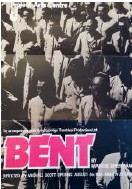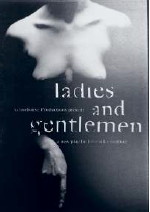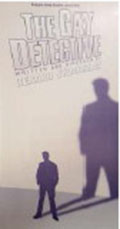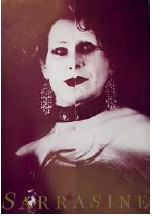Foul Filthy Stinking Muck
Over its 50+ year history, Project Arts Centre has proven to be a worthy ally in the fight for LGBT+ liberation.Today, it continues to use its platform as an artist-led organisation to give the community a voice by hosting events and presenting queer performance in a way that no other theatre or arts centre in the country has. Hannah Tiernan elaborates. Images courtesy of the National Library Of Ireland.


As early as 1976, only two years after the establishment of the Irish Gay Rights Movement, Project teamed up with the group to present two plays by the London based lesbian and gay theatre company, Gay Sweatshop. Although Any Woman Can and Mister X were not the first ‘gay’ themed plays to be put on in Ireland, they were the first to tell the real stories and experiences of lesbian and gay people. The plays resulted in a funding crisis, with Dublin Corporation refusing to grant £6,000 to the centre. The decision resulted in a heated public debate with a letter to the editor of the Evening Press describing the plays as “...foul, filthy, stinking muck”. Although the corporation maintained that the decision related to uncertainty surrounding the lease of the premises and had nothing to do with the plays, Councillor Ned Brennan called them, “Funny Bunnies from across the water”. The Corporation was forced to revoke the decision when Project managed to purchase the site at East Essex Street.
This funding crisis didn’t stop Project from presenting LGBT+ themed work though, and five years later, Michael Scott directed Bent. Written by Martin Sherman, the play had already been a hit in the West End and on Broadway. It told the story of Max, a gay Jewish man, captured by Nazis during the Second World War, for holding hands with his boyfriend. In order to receive more favourable treatment, Max convinces the guards that he is not gay in order to wear a Jewish star instead of the homosexual pink triangle. In Dachau, he falls in love with Horst, a known homosexual. The two are not allowed to touch, so during a scene where they have to stand to attention, they describe having sex together and reach orgasm. When Horst is killed by a guard, Max is forced to bury him. He jumps into the grave, puts on Horst’s jacket with the pink triangle and kills himself, dying as a proud gay man.
The main controversy over the play came from Jewish critics in New York who claimed that it undermined the Jewish holocaust in favour of a homosexual agenda.
The next major play was in 1987, also directed by Scott. The Normal Heart told the story of the first years following the outbreak of AIDS in New York. Scott maintained that the Irish Government’s decision to remove funding from the AIDS campaign and redirect it into a general election that year as the reason for producing the play.
The following year, Project presented Sea Urchins, written by Aodhan Madden. Inspired by the murder of Declan Flynn, it was the first play to directly respond to the event. This sparked a move towards presenting more works by Irish writers and producers. In 1990, it presented Wet Paint Arts’ Tangles - a play devised for a youth audience, telling the story of a young man coming out to his friends. As well as looking at issues of bullying, it also addressed his straight friend’s concerns over what others would think about him having a gay friend; issues that were rarely portrayed in public.
Declan Hughes’ Digging for Fire in 1991 once again raised the issue of AIDS, however within an Irish context. Gerard Stembridge’s 1996 play, The Gay Detective, was set on the eve of decriminalisation in 1993. Among other things, it looked at the position of Pat, the character of the gay detective, and his challenge of law-maker as a Garda and law-breaker as a gay man.
Project was also the first to produce Emma Donoghue’s two plays, I Know My Own Heart in 1993 and Ladies and Gentlemen in 1996. Although it was 17 years since Gay Sweatshop’s Any Woman Can, they were the first major lesbian-themed plays produced in the country. And Project’s record of supporting minority voices didn’t stop there. In 1984 it presented Operating Theatre’s The Diamond Body about the death of a hermaphroditic nightclub owner, told through the eyes of his androgynous lover. Sarrasine, in 1991, told a love story about a man who falls in love with a castrato singer who presents as a woman. Considering the lack of conversation or knowledge surrounding transgender issues, these were ground-breaking in their time.


Since the presentation of these earlier works, Project has continued to present LGBTQ themed plays, expanding its catalogue year-on-year. In 2009 and 2010 it hosted THISISPOPBABY’s Queer Notions festivals. As part of the 2009 festival, Una McKevitt’s The Big Deal told the story of the friendship between two trans women, demonstrating their support for one another through gender reassignment. The 2010 festival presented Neil Watkins’ The Year of Magical Wanking addressing Watkins’ porn and drug addiction resulting from abuse.
Project continues to address and highlight issues often unspoken about within the community and wider society, such as Sonya Kelly’s 2011, How To Keep An Alien, looking at a samesex couple having to prove their relationship in order to apply for a residency visa. Or the 2015 presentation of Amy Conroy’s I Heart Alice Heart I, which considered a lesbian relationship between an older couple in their 60’s.
As well as presenting most of Panti’s stage shows, last year it hosted I Am Tonie Walsh, an autobiographical show, which acted both as a historical remembering of the LGBT+ liberation struggle but also a tribute to those who died from AIDS.
Although the community has achieved a massive level of equality, there are still many areas that need to improve. No doubt Project Arts Centre will continue to play a role in highlighting these issues and bringing them to a wider audience.